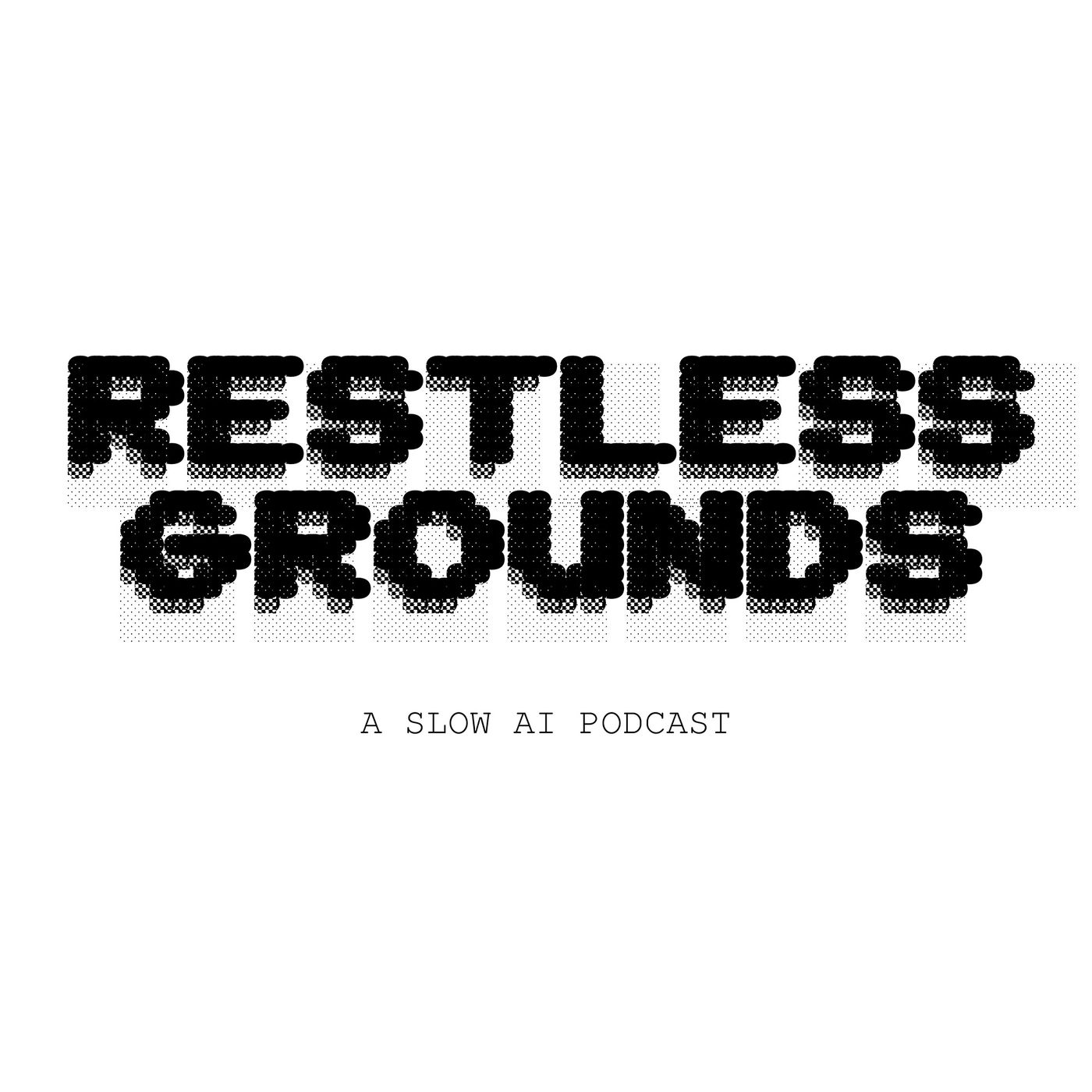Restless Grounds

Restless Grounds
Podcast Description
This series is part of the Slow AI project, a collaborative research initiative that emerged from a growing discomfort with the ways artificial intelligence is transforming our world and how quickly it is being developed and implemented, while its extractive, colonial histories remain largely unacknowledged.From image generation and chatbots to facial recognition and predictive policing, AI systems are shaping what we see, how we remember, how we make decisions, and eventually who we become.Rather than trying to fix or limit these technologies, Slow AI asks how we might relate to them differently. It is not a technical solution, but a shift in orientation: toward care, collectivity, and refusal.Each episode features a conversation from our research group, comprising artists, writers, and researchers working at the intersection of theory and practice. These conversations emerge from our Material Playgrounds: experimental sessions that explored algorithmic technologies through artistic research, speculation, and collaborative inquiry.Messy, curious, and sometimes unresolved, this podcast invites you to imagine these technologies otherwise.This podcast is part of the Slow AI project, initiated by Mariana Fernández Mora and supported by the Visual Methodologies Collective (AUAS), the Algorithmic Cultures Research Group (Sandberg Institute), ARIAS Amsterdam, and funded by the Centre of Expertise Creative Innovation (CoECI).
Podcast Insights
Content Themes
The podcast focuses on the intersection of artificial intelligence, history, and culture, discussing themes such as the implications of AI in society and the need for a shift in orientation toward care and collectivity. Episodes explore topics like algorithmic histories and magical thinking, drawing on personal anecdotes and critical theory.

This series is part of the Slow AI project, a collaborative research initiative that emerged from a growing discomfort with the ways artificial intelligence is transforming our world and how quickly it is being developed and implemented, while its extractive, colonial histories remain largely unacknowledged.
From image generation and chatbots to facial recognition and predictive policing, AI systems are shaping what we see, how we remember, how we make decisions, and eventually who we become.
Rather than trying to fix or limit these technologies, Slow AI asks how we might relate to them differently. It is not a technical solution, but a shift in orientation: toward care, collectivity, and refusal.
Each episode features a conversation from our research group, comprising artists, writers, and researchers working at the intersection of theory and practice. These conversations emerge from our Material Playgrounds: experimental sessions that explored algorithmic technologies through artistic research, speculation, and collaborative inquiry.Messy, curious, and sometimes unresolved, this podcast invites you to imagine these technologies otherwise.
This podcast is part of the Slow AI project, initiated by Mariana Fernández Mora and supported by the Visual Methodologies Collective (AUAS), the Algorithmic Cultures Research Group (Sandberg Institute), ARIAS Amsterdam, and funded by the Centre of Expertise Creative Innovation (CoECI).
In this bonus, uncut conversation, host Mariana Fernández Mora explores, in conversation with Angelo Custódio, the presence of the body in technological environments, its capacity for listening, and its role in collective emergence. Together, they discuss his work with voice, sound and somatic practice, where technology becomes a relational object rather than a tool of detachment.
The discussion considers technosomatics as a way of keeping the body active inside technical systems, and how amplification, algorithmic effects and improvisation can open spaces of play that unsettle anxiety, expectations and default modes of expression. Listening emerges as a shared and negotiated form of attention, while vulnerability is understood as a condition for co-creation that requires continuous care.
The episode reflects on how sound, embodiment and micro-resistances might interrupt the extractive logics of algorithmic design and invite alternative ways of sensing, relating and staying with complexity.
At the end, you’ll be able to listen to “Something Older”, an audio piece created during the Material Playground Everything Evaporates in the spring of 2025. This piece was guided by Angelo and created in collaboration with the participants. The soundscapes in this episode were also created during this session. Thank you for listening, and see you next season!

Disclaimer
This podcast’s information is provided for general reference and was obtained from publicly accessible sources. The Podcast Collaborative neither produces nor verifies the content, accuracy, or suitability of this podcast. Views and opinions belong solely to the podcast creators and guests.
For a complete disclaimer, please see our Full Disclaimer on the archive page. The Podcast Collaborative bears no responsibility for the podcast’s themes, language, or overall content. Listener discretion is advised. Read our Terms of Use and Privacy Policy for more details.